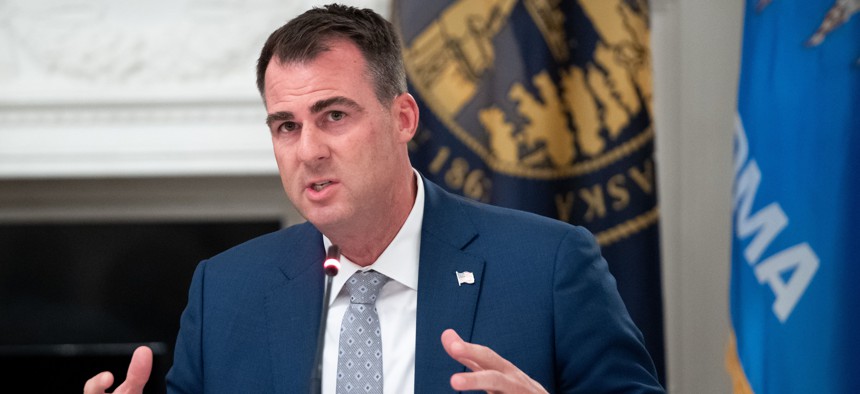The Growing Movement to Halt Executions in Conservative States

Photo by SAUL LOEB/AFP via Getty Images
Right-leaning activists are speaking out against the death penalty, saying capital punishment is morally wrong, fails to deter crime and is flawed in other ways as well.
Brett Farley, the former communications director for the Oklahoma Republican Party, is a fiscal conservative and an opponent of legalized abortion. But Farley is also an outspoken advocate against the state’s death penalty.
“The fact that we cannot absolutely prevent the execution of innocent or mentally incompetent people betrays the conservative principle of the sanctity of life,’’ he said. “How many more people are we willing to put to death … before we as a conservative state decide to hit the pause button?”
Farley, the executive director of the Oklahoma Catholic Conference, joined Adam Luck, former chairman of the Oklahoma Pardon and Parole Board, at a press conference in Oklahoma City Thursday, one day after the execution of James Coddington, who admitted to killing a coworker with a hammer in 1997.
Oklahoma Conservatives Concerned About the Death Penalty is part of a national movement of conservatives rethinking capital punishment. It is one of 13 state-based chapters that is pushing for the repeal of death penalty statutes or at least a temporary halt to executions.
The conservative argument against the death penalty holds that executions are morally wrong, costly to implement, and stressful for the families of murder victims. They also say the death penalty fails to act as a deterrent against crime.
“When it comes to our philosophy that government should be small and limited, the death penalty falls very short,’’ said Demetrius Minor, the group’s national manager. “Many of us are disturbed by how the death penalty is an emotional roller coaster for family members of murder victims and why we’re investing so much in a system that doesn’t keep us safe or serve as a deterrent to crime.”
The cost of the process—including the constitutionally required appeals guaranteed to those facing the death penalty—is steep, Farley said. “The fiscally responsible thing to do is to take a look at the options that we’d have if we were to get rid of the death penalty, take that money and put it into victims’ families support … [or] back into public safety.”
Turning Attention to Red States
Since 2009, seven states—New Mexico, Illinois, Connecticut, Maryland, New Hampshire, Colorado and Virginia—have done away with the death penalty, replacing it with life imprison with no possibility for parole.
Activists are turning their attention to red states. In Utah earlier this year, a Republican-led push to repeal the death penalty fell one vote short of advancing in the legislature.
The death penalty is “big government at its core,’’ Minor said. “We don’t trust the government to give accurate Covid numbers … so why would we trust the government … in a matter of life and death? These are messages that resonate with conservative lawmakers.”
Oklahoma, one of the most conservative states in the nation, could be a challenge for anti-death penalty activists. Of the 10 executions so far in 2022, three occurred in Oklahoma. Gov. Kevin Stitt, a Republican, is a supporter of the death penalty and rejected Coddington’s request for clemency.
The state’s recent history with capital punishment is marked by botched executions, according to the nonprofit Death Penalty Information Center. In 2014, officials mishandled the execution of 38-year-old Clayton Lockett, who writhed and convulsed in a pool of blood before he died 43 minutes after drugs were first administered. The following year, correction officials used the wrong drug—potassium acetate, not potassium chloride—to execute 47-year-old Charles Warner.
In response, Oklahoma halted executions for nearly seven years, but resumed the practice this year. The state plans to execute 24 more incarcerated people over 29 months.
Advocates say they are having conversations with Republican lawmakers in hopes of crafting legislation to temporarily halt executions or permanently repeal the death penalty.
“We’re looking at all the options,’’ Farley said. “Everything’s on the table. We’re just going to assess which one is most likely to at least get us the moratorium so we have the time to step back … and take another look at our process.”
Daniela Altimari is a reporter with Route Fifty.
NEXT STORY: Strategies for Solving Homelessness Across the US





